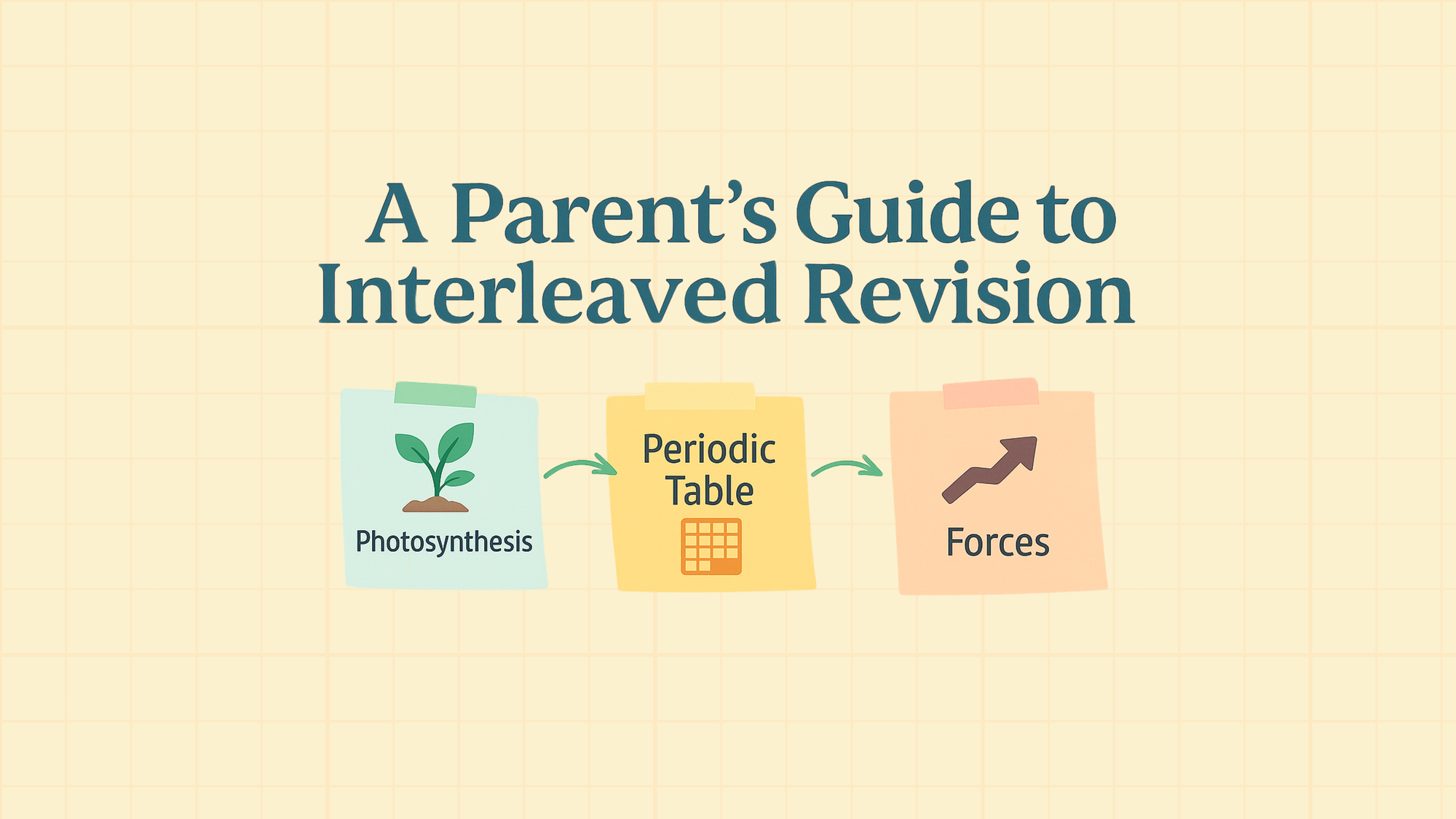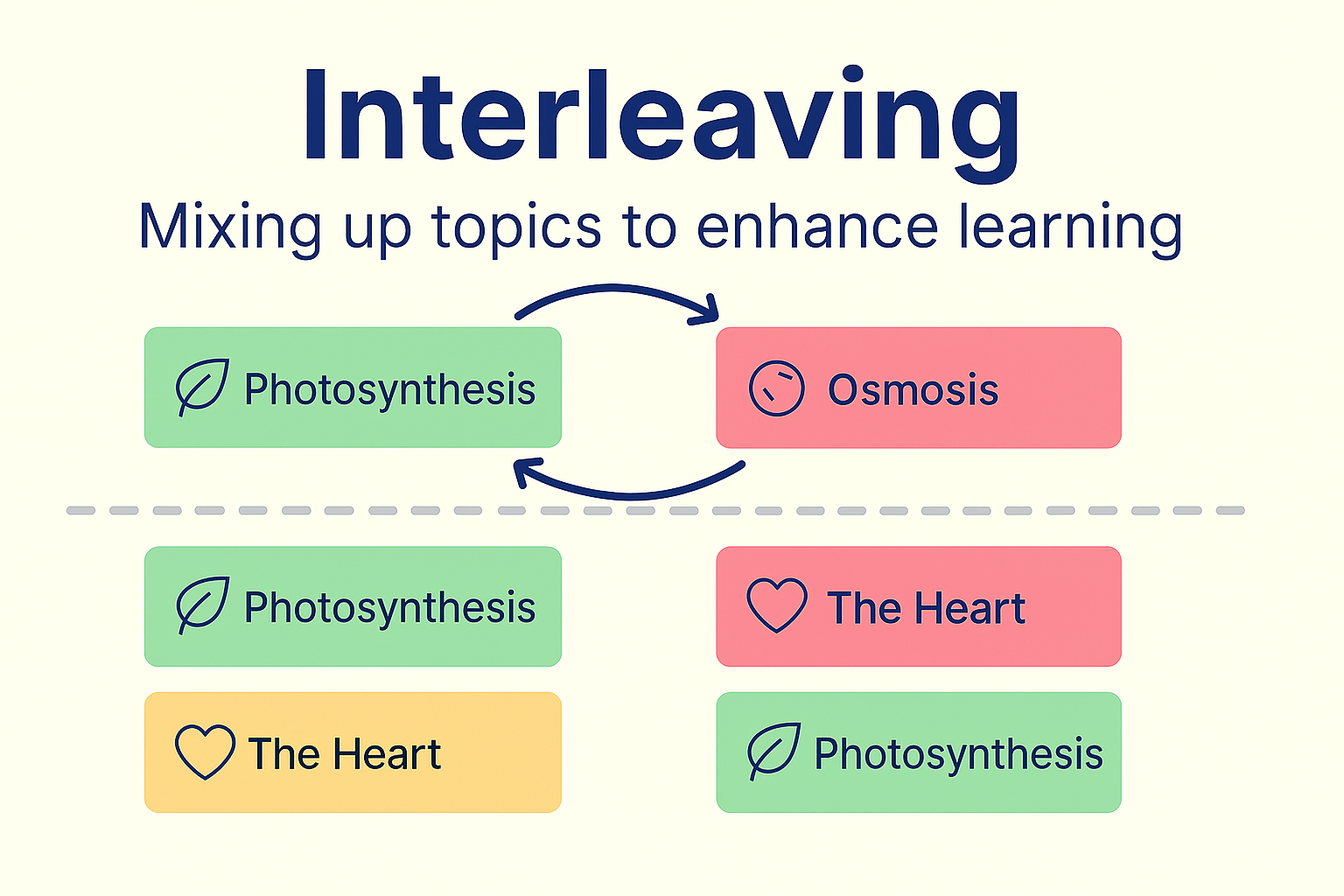Interleaving: The Smarter Way to Revise (That Most Students Never Learn)

There’s a problem with how most students revise for science.
They pick a topic—say, photosynthesis—and spend an hour on it. The next day, it’s the periodic table. Then forces. One block at a time, neat and tidy.
It feels logical. It feels efficient. But it’s exactly the problem.
When I was revising—whether it was for GCSEs, A-levels, or even medical school– I did the same. I’d focus on one topic for hours, trying to master it before moving on. And by the end of the session, I’d feel mentally drained.
But the real issue showed up later. When I tried a mixed set of questions, I struggled. I couldn’t switch between ideas. I couldn’t see how topics connected.
And that’s when I realised:
It wasn’t just about knowing a topic. It was about using it, applying it, and moving between topics in the way exams demand.
That’s where interleaving comes in.

What is Interleaving?
Interleaving is a simple shift in how you revise.
Instead of spending a full hour on just one topic—like photosynthesis—you break it up and mix different topics within the same subject.
For example, in Biology, your child might do:
- 20 minutes on photosynthesis
- 20 minutes on osmosis
- 20 minutes on the heart
Or in Chemistry:
- 20 minutes on bonding
- 20 minutes on rates of reaction
- 20 minutes on electrolysis
This approach feels messier. It feels harder. But that’s the point.
Interleaving helps the brain build flexibility—the ability to switch gears between topics, spot connections, and apply knowledge in different ways.
It mirrors what happens in the real exam, where questions don’t come in neat topic blocks.
Interleaving vs. Mastery: When to Focus, When to Mix
Here’s where it gets important—because interleaving isn’t the answer to everything.
When your child is first learning a topic—say, they’ve never covered the heart before—they do need to focus on that topic in isolation.
They need to understand the core concepts, work through examples, and build a foundation.
This is where deep focus matters. It’s about learning the basics before moving on.
But once they’ve done that initial learning, sticking with block revision can become a trap. It feels familiar, but it doesn’t build the skills they’ll need for the exam:
- Switching between different topics
- Applying knowledge in new contexts
- Spotting patterns across the subject
That’s where interleaving comes in.
Once the basics are covered, they should start mixing topics within a subject.
For example, in Biology: One session might include enzymes, diffusion, and the heart. Another might include inheritance, the nervous system, and photosynthesis.
In Chemistry: Bonding, rates of reaction, and energy changes.
It’s about building the mental flexibility to handle the real exam, where no one tells you, “Here are five questions on osmosis—off you go.”
The Catch
Interleaving isn’t a last-minute fix.
If your child’s exam is next week and they’re shaky on a specific topic, they do need to focus on that one area.
This is the time for targeted revision—plugging gaps, reviewing mark schemes, and building confidence.
Interleaving is a strategy for the long game.
It works best when revision starts early—throughout the year—not crammed in the final few weeks before the exam.
That’s why I encourage families to think about revision as a process, not a sprint at the end.
How to Get Started
You don’t have to overhaul everything at once. Start small:
- Mix two or three topics within a single subject during revision.
- Use mixed-topic past papers for practice (use SaveMyExams or Physics & Maths Tutor to make your own mixed question banks)
- Help your child see links between topics—how diffusion connects to gas exchange, or how energy changes link chemistry and physics.
It will feel harder. That’s normal.
But harder isn’t bad—it’s a sign the brain is learning.
Final Thoughts
Interleaving won’t make revision feel easy... It’s not supposed to.
But if your child is working hard and still struggling to apply what they know across topics, this could be the shift they need.
New groups start in July.
👉 Join the Priority Access List here to get early access when spaces open.

